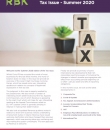The Tax Appeals Commissioners (TAC) recently considered the definition of what constitutes a ‘professional service’ for the purposes of the close service company surcharge.
By way of background, Irish tax legislation provides for a surcharge on the undistributed income of certain professional service companies that are “close companies” (i.e. an Irish company that is under the control of 5 or fewer participators). The surcharge applies where the principal part (more than 50%) of the company’s income is derived from the carrying out professional services. The legislation imposes a surcharge of 15% on 50% of the company’s undistributed professional and service income. The surcharge does not apply if such income is distributed within 18 months of the end of the accounting period in which it arose.
The TAC case concerned an accountancy practice that provided clients with consultancy, advisory, audit, tax compliance and bookkeeping services. The accountancy practice did not include the surcharge in their corporation tax return on the basis that the principal part (i.e. more than 50%) of the income for the year under review was derived from ‘non-professional’ services such as the provision of bookkeeping & payroll services and a once off project involving a share redemption. The taxpayer also argued that time spent by junior members of staff did not constitute a professional service as many of the employees had not completed professional exams.
The Appeal Commissioners agreed that the bookkeeping and payroll services provided did not constitute a professional service for the purpose of the surcharge. However, they did find that time spent by junior members of staff in connection with the audit file and the once off consultancy project were professional services. This was on the basis that company was providing these services on foot of their status as a firm registered with the Institute of Chartered Accountants. The Appeals Commissioner stated in their determination that “great weight should be placed on the guidance of a professional accountancy services regulating body, such as ICAI, in determining what constitutes the work of an accountant(s) or the provision of accountancy services.”
Subsequent to the decision in the TAC case, Revenue have updated their Tax Duty & Manual to confirm that preliminary work done which of itself could be considered “nonprofessional” in nature, but which is integral to enabling the company to provide a “professional” service, such work should not be classified in isolation as non-professional but rather will be considered to be integral to and part of a “profession/professional service”. The publication also confirmed that any business involving tax planning, be it investing or structuring, should be considered a professional service. Revenue have specifically updated their guidance notes to state that “Where a professional body provides guidance regarding the activities of that profession, the guidance will be an important factor in establishing if a company is a “service company”” which is very similar to the actual determination of the Appeals Commissioner, referred to above.
Under general VAT principles, the supply of medical services is exempt from VAT whereas the provision of staff is a Vatable activity subject to VAT at the standard rate. Revenue have long argued that where a doctor incorporates and provides services (such as locum or after hours services) that the intermediary company is doing just that, providing staff (23% VAT) rather than providing medical care. It is on this basis that Revenue have raised assessments to various entities since beginning its “Medical Consultants Project” demanding VAT that had, according to them at least, been underpaid.
Interestingly, a recent decision by TAC has cast doubt over the position taken by Revenue. In the case brought before TAC, the appellant was a GP who disagreed with notices of assessment to VAT raised by Revenue in respect of the years 2011 to 2013 inclusive (albeit the 2011 assessment was disregarded as out of time). Revenue took the position that the intermediary company set up by the locum was providing staffing services and not medical care on the basis that the GP’s intermediary company had been engaged by clinics rather than directly with patients.
TAC concluded in favour of the taxpayer and quashed the assessments raised by Revenue. In arriving at the decision the commissioner relied on settled law of the Courts of Justice of the European Union stating that “The settled law requires that the medical services exemption also applied to a company where the services are being provided “by persons who possess the necessary professional qualifications”. To determine otherwise would be to undermine and disregard the clear jurisprudence of the CJEU”. It is worth reiterating that Irish VAT law is actually based on EU law and decisions of the European Courts on VAT matters can be binding. This applies not just to taxpayers but to the Revenue as well.
It is interesting to note that the Revenue issued updated guidance notes that reiterated their view of the treatment of medical consultants/locums in May of this year (see further commentary in Section 4). In their guidance notes, they reaffirmed their view that the supply of locum services by a company constituted a supply of staff subject to VAT at the standard rate. Notwithstanding the Appeal Commissioner’s succinct determination which referenced very clear EU caselaw, the Revenue Commissioners have confirmed that they will be appealing the decision of the Tax Appeals Commission to the High Court. We will keep the matter under review.


Tax Issue - Summer 2020 137.61 KB
Whilst Covid-19 has occupied the minds of most businesses for the last three months, the world of taxation does not stop. In this issue we provide an overview of the recent High Court case involving Perigo, which has raised some very interesting questions in relation to concepts of legitimate expectative in Irish tax law. We also review a number of interesting recent determinations of the Tax Appeals Commissioners. We look at updated Revenue guidance notes in relation to short term business visitors undertaking employment duties in Ireland. Finally we provide a summary of some international tax developments that Irish corporates need to be aware of including the changes in Ireland’s transfer pricing regime with effect from accounting periods beginning on or after 1 January 2020 and DAC 6 reporting obligations.
DownloadOur offices are strategically located to service our market and are easily accessed from any location nationwide.
Termini,
3 Arkle Road,
Sandyford, Dublin,
D18 C9C5, Ireland
RBK Incorporating OMC O'Malley & Company Limited,
Upper Chapel Street,
Castlebar, Co Mayo,
F23 PF21, Ireland
RBK House, Irishtown
Athlone,
Co. Westmeath,
N37 XP52, Ireland
RBK Incorporating MCP Accountants,
Breaffy Road,
Castlebar, Co Mayo,
F23 DY67, Ireland
